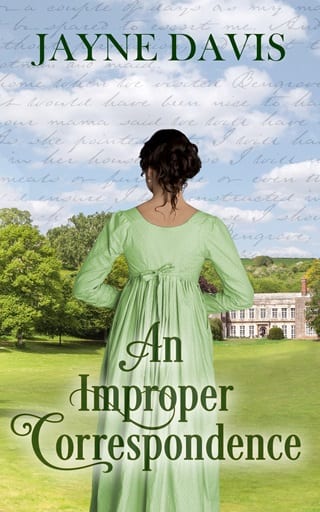Chapter 7
CHAPTER 7
L ondon, March 1813
"The post, sir." Chivenor's voice carried through the open door to where Jo was doing her weekly task of extracting articles of interest from the Gazette and the other newspapers that Papa subscribed to. Farley, Papa's secretary, could do it, of course, but she enjoyed keeping abreast of new ideas and projects, and discussing them with her father. Today's paper had reports about a new steam locomotive and steam passenger services on the River Clyde in Scotland. More worryingly, there was also news of more Luddite machine-breaking in the north-west. That might affect the shares Papa held in a company that made machines for textile mills.
Chivenor came into the library a few minutes later. "Mr Stretton has a letter for you, Miss."
Oh good, Alfred must have written at last! She set the paper aside and went to Papa's study. He pushed a letter across his desk as she entered.
"Is that Bengrove's handwriting, Jo?"
Jo took the letter and glanced at the direction, disappointment replacing anticipation. "No, Papa. You remember he had injured his hand, so his friend wrote for him? This looks like the same hand. "
"Ah, yes. I'm surprised he hasn't written more often; he must have plenty of time now."
"I suppose he doesn't have much to write about," Jo said. But they had talked about all sorts of things during their brief time together at Yelden, so should they not be able to do so by letter? "He will probably write more often when he can pen his own letters."
"True, true." But her father had lost interest and was looking at his ledgers again, not at her.
Jo turned the letter over in her hands, but did not open it. It might include some more personal feelings than the last letter she had received, in which case she would prefer to read it while alone. She took it up to her room, where she would not be interrupted.
Dear Miss Stretton,
I am once again acting as an amanuensis for Captain Bengrove. The text below is entirely dictated by him.
Yours, with respect,
Capt. R. Delafield
The previous letter had started in a similar fashion, but this declaration that the words were entirely dictated by Alfred seemed a bit more… direct?
She read on, thinking that this Captain Delafield's writing was much easier to read than Alfred's scrawl.
My dear Joanna,
I was happy to hear that you visited my parents. If only I could have been there with you. It seems so long since we were together and I gazed upon your lovely face.
There followed several more lines in a similar vein. Jo quickly skimmed over them. Somehow the written compliments did not seem as sincere as they had when Alfred said them to her in person last summer .
I am sorry your visit to our future home was cut short. You must have enjoyed seeing where you will be living when I can return to England and claim you as my own. I long for the time we can be together, and the thought of you waiting patiently for me does help the time to pass.
Life is very restricted here. Having given our parole, we are free to wander around the town, and a short distance from it, but we cannot go elsewhere without special permission, and we are required to sign a register in person every five days. There is little to do, and at present I have few funds to allow me to repair my damaged uniform or to relieve the tedium of being incarcerated here.
I am in poor lodgings, not at all what I am used to. Winter quarters in Portugal, although they often resembled the accommodations of the lower orders, were far preferable, and we could ride or hunt and go about as we pleased. If only I had your delightful presence, the days here that stretch before me would not seem so onerous, and I long for the time when I can take you in my arms again…
Jo scanned the rest of the letter quickly, a blush reddening her cheeks. It wasn't just the words about wanting to hold her, but the fact that he had dictated them to someone she didn't know. She hoped that Captain Delafield was a good friend of his, for it seemed very indelicate for Alfred to share such feelings with a stranger.
She put the letter aside to read again later, and returned to her work in the library. That evening, when she retired to bed, she re-read it. Her last letter to him had mentioned Mama's continuing ill health, but he hadn't referred to Mama at all in his reply.
It must be frustrating for a soldier to be kept kicking his heels while there was fighting to be done. On the other hand, her father had said of his short time in the army that being a soldier was mostly tedium interspersed with brief periods of action, so Alfred should be used to long stretches of inactivity. As for restrictions on where he could go—she'd had to live by those rules all her life. By the time she finally blew the candle out she was feeling quite annoyed with him.
Verdun, April 1813
One of the men Campbell sent to call on Rob while he was laid up was Lieutenant Simon Moorven of His Majesty's Navy. He had come late one afternoon, armed with a couple of bottles of decent red wine; Madame had approved of his polite manners and asked him if he wished to stay for dinner. As the two men were well into the second bottle by that time, he had accepted, and sent out for more wine later while they were still exchanging their experiences of the war.
As he related to Rob, Lieutenant Moorven had been captured some eighteen months earlier, after he'd been knocked overboard by a falling spar during an engagement in the Channel. His civilian clothes were of better quality and fit than those Rob saw on most of the British prisoners, which spoke to Rob of plentiful money sent from home. He was the eldest son of the Earl of Claverden, and so more properly addressed as Viscount Moorven, but he chose not to use his title amongst his fellow officers. As he explained to Rob, he had three younger brothers at home, all more interested in managing estates and property than he was, so his father hadn't minded too much when his youthful interest in ships and the sea had turned into a firm determination to join the Navy. Rob found his attitude refreshing after Bengrove's air of superiority.
Bengrove returned just as Moorven was about to leave for his own lodgings. Rob introduced him as Lieutenant Moorven, and was amused to notice Bengrove's supercilious expression until he added "of the Royal Navy". That made them of equivalent rank, and Bengrove's expression turned to a frown. The two men talked for a few minutes before Bengrove took himself upstairs, but in that time he managed to drop into the conversation the fact that his father was a viscount.
"You could have told him your father's rank," Rob commented when Bengrove was out of earshot, giving in to the laughter he had managed to contain until then.
"And spoil the fun?" Moorven grinned. "I'll let him pretend superiority a few more times, I think." He donned his cloak and hat and took his leave, promising to call back in a couple of days.
The following afternoon Bengrove came into the parlour where Rob was reading and dropped a letter on the table. "You thought I shouldn't have sent that last letter."
Rob looked up, wondering what Bengrove was talking about. "Letter?"
"To my betrothed. You asked if I was sure I wanted to send it."
Rob just nodded, bringing to mind the letter in question.
"Read that."
"You want me to read Miss Stretton's reply to you?" Rob asked incredulously.
"Why not? Shows she knows her place properly. That letter worked, d'you see?" He pushed the letter towards Rob.
Rob picked it up reluctantly. Bengrove made an impatient gesture, and Rob looked at it. He skimmed over the first few sentences, which hoped Bengrove was well, then read on.
I have been confined to the house for several days, as my maid is unwell and the footman could not be spared to escort me. And of course I cannot go further afield without permission, and must take the carriage and footman and maid.
It was good to see your family home when we visited Bengrove Hall last month, although it would have been nice if your mama had shown me the apartments set aside for you on your marriage. As she pointed out, I would have nothing to do, as she would continue to run the house and make all decisions about meals and furniture, and most other details. However, she did ensure I was instructed, in detail, about the correct way to run such a house, in case I should live in one at some time in the future. While living at Bengrove Hall, I would be free to spend all my time practising my lady-like accomplishments. And as you would take all important decisions, I would have nothing at all to think about, which, naturally, is the aim of all proper young ladies .
Lady Bengrove also explained all about the neighbouring families, including those of lesser rank who would be prepared to receive me on any future visit to Bengrove Hall, and the ones of higher status who might be reluctant. But she assured me that, once I have demonstrated that I can conduct myself in a suitably lady-like manner, and pay sufficient deference to their superior rank, I may be permitted to mix with them in spite of my somewhat distressing connections with trade. I was very grateful to have my proper place so clearly explained.
I know you failed to ask about my mother's health in your last letter out of concern for me, not wanting to bring distressing facts to my mind unnecessarily. I am happy to reassure you that as I write this, she is feeling a little better.
The final paragraphs said that she hoped the war would be over soon so he could return. Rob's eyebrows rose as he read the letter, but he managed to keep a straight face.
"See, she's looking forward to getting married. Women's minds don't work like ours, you know."
"So she is, Bengrove. And so they don't. I bow to your superior knowledge." Poor woman—betrothed to a self-pitying blockhead who couldn't see sarcasm when it was staring him in the face. Rob handed the letter back and picked up his book. Bengrove smirked and tucked the letter back into his pocket. "I take it you can write your own letters from now on?" Rob asked.
Bengrove shrugged. "The hand isn't quite right yet, but I'll manage. Not much to say, in any case."
Rob kept his eyes on his book, not wanting to be drawn into a further discussion on the subject. Or on any other subject, come to that. Bengrove hung around for a few more minutes, but eventually took himself off out of the house.
Rob was finishing his dinner that evening when Bengrove stuck his head around the door again .
"Is the old bat in?"
" Madame Daniau has gone to see a friend," Rob said.
Bengrove grinned, and a few moments later returned with a buxom young woman with quantities of golden hair; so buxom that she was almost falling out of her dress, and hair so golden that it was surely dyed. If that weren't enough, the bright red lips and painted face made her profession obvious.
"Not here, Bengrove. This is Madame's private parlour."
"Oh, be a sport, Delafield. The bedroom's tiny."
"How much space do you need?" Rob asked impatiently, making no move to get up. "I'm not dragging myself upstairs just so you can shag your woman in Madame's sitting room. I don't imagine she'd like it either."
"I'm paying for lodgings."
"Are you?" Madame had complained recently that Bengrove owed her for the coming month.
The woman giggled, making her breasts jiggle, and pulled on Bengrove's hands. With a mutter about the ‘bloody infantry', he allowed himself to be dragged upstairs.
Rob sighed. Sure enough there was soon a rhythmic creaking as bed ropes moved under the strain. And, in what turned out to be really bad timing for Bengrove, Madame Daniau arrived home as the noise was reaching a crescendo.
It took her a moment to work out what the sounds were. She glared at Rob, who just shrugged, then she dropped her basket on the table and went through to the kitchen. Rob heard the clank of a bucket and then the pump handle. Now Rob wanted the pair upstairs not to finish what they were doing, not until Madame had reached the bedroom. He sat back and listened with glee as Madame crept up the stairs, although he doubted they would hear if she stamped up. Then there was a bang as she flung the door open and a yell from Bengrove and a shriek from the woman, followed by some very loud swearing. He couldn't help laughing.
Madame came back down and headed straight out of the door again, returning a few minutes later with two men. Rob recognised them as labourers who lodged further down the street. Large labourers, with well-developed muscles. Better and better!
Fifteen minutes later, after Rob had translated Madame's refusal to have such goings on in her house or to allow Bengrove to stay one night longer, Bengrove and his belongings—some of them still dripping—were forcibly deposited on the street outside. The labourers were given dinner in return for their help and, Rob suspected, to keep them around until Madame was sure Bengrove had gone.
By this time Rob was managing to get outside for short periods, hopping along with the aid of his crutches. Campbell's digging around in his arm had set this activity back a bit, but there was hardly a twinge from that sabre slash now, and his leg didn't protest when he moved around. Campbell had removed the splints and bandages on his ankle, but told him that anything that caused discomfort was still to be avoided. Even if he could not get far, or go fast, the opportunities for a change of scenery every day cheered him up enormously. The weather was typical for April, with sunny days interrupted by heavy showers; buds and leaves were unfurling on the trees in gardens and the fields surrounding the town, and daffodils were beginning to flower in window boxes and under hedges. Having spent the last three springs in Spain, Rob appreciated the verdant countryside he could see from the edges of the town.
The day after Bengrove had given him Miss Stretton's letter to read he found a tavern with some outside tables in a sunny sheltered spot, and sat with a pint of ale. He considered the letters again, remembering what he had written for Bengrove a few weeks before, and wondering if he had misunderstood the tone of Miss Stretton's reply. But what she had written was a fair mirror of the complaints Bengrove had put in his letter, and the more he thought about it, the more he was sure that Miss Stretton had written the whole letter in the same vein .
When he finished his drink, he checked how many coins he had left in his pocket and picked up his crutches. He needed more paper, as it was time to write to his family again. And perhaps he'd write another letter as well.
 Fullepub
Fullepub 



